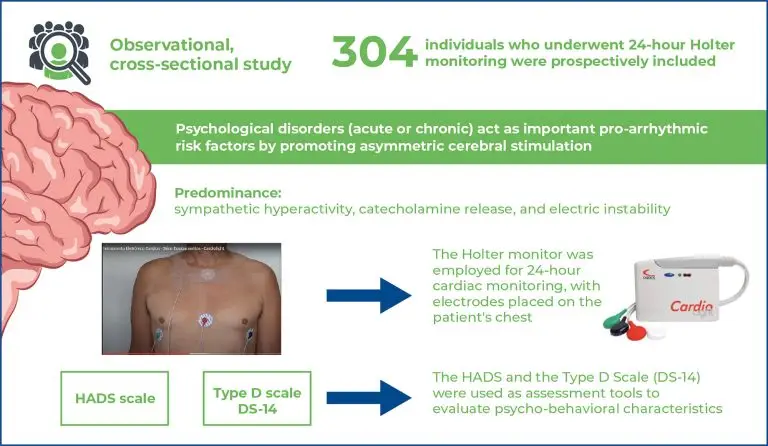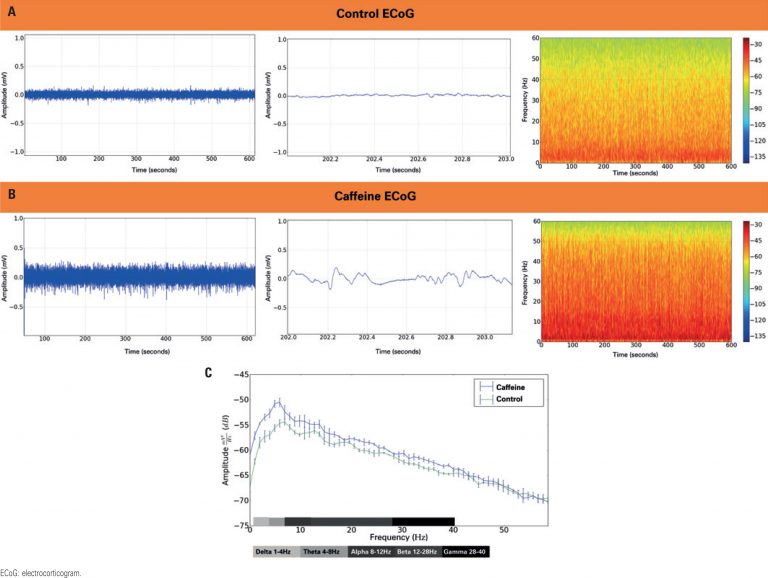14/Mar/2025
Is self-perception of cardiac symptoms related to the psychological profile of patients? A cross-sectional study of individuals undergoing 24-hour Holter monitoring
einstein (São Paulo). 14/Mar/2025;23:eAO0742.
View Article14/Mar/2025
Is self-perception of cardiac symptoms related to the psychological profile of patients? A cross-sectional study of individuals undergoing 24-hour Holter monitoring
DOI: 10.31744/einstein_journal/2025AO0742
Highlights ■ Self-reported cardiac symptoms not associated with arrhythmias. ■ High prevalence of anxiety and depression symptoms. ■ Anxiety was correlated with self-reported cardiac symptoms. ABSTRACT Objective: This study aimed to examine the presence of psychological characteristics and their association with self-reported cardiac symptoms in individuals undergoing 24- hour Holter monitoring. Methods: This observational cross-sectional study included 304 individuals who consecutively underwent 24-hour Holter monitoring. Clinical, demographic, and electrocardiographic data were collected. Psycho-behavioral characteristics were assessed using the Hospital Anxiety […]
Keywords: Anxiety; Arrhythmias, Cardiac; Electrocardiography; Electrocardiography, ambulatory; Heart diseases; Holtermonitoring; Mental Health; Monitoring, physiologic
03/Nov/2021
Characterization of electrocorticographic, electromyographic and electrocardiographic recordings after the use of caffeine in Wistar rats
einstein (São Paulo). 03/Nov/2021;19:eAO6417.
View Article03/Nov/2021
Characterization of electrocorticographic, electromyographic and electrocardiographic recordings after the use of caffeine in Wistar rats
DOI: 10.31744/einstein_journal/2021AO6417
ABSTRACT Objective: To describe electrocorticographic, electromyographic and electrocardiographic profiles to report the electrophysiological effects of caffeine in Wistar rats. Methods: Male adult Wistar rats weighing 230g to 250g were used. Rats were allocated to one of two groups, as follows: Group 1, Control, intraperitoneal injection of 0.9% saline solution (n=27); and Group 2, treated with intraperitoneal injection of caffeine (50mg/kg; n=27). The rats were submitted to electrocorticographic, electromyographic and electrocardiographic assessment. Results: Brain oscillations (delta, theta, alpha, beta and gamma) […]
Keywords: Caffeine; Central nervous system; Electrocardiography; Electrocorticography; Electromyography; Rats; Wistar
18/Mar/2019
Electrocardiographic changes in spondyloarthritis and use of anti-TNF-α drugs: a retrospective study with 100 patients
DOI: 10.31744/einstein_journal/2019AO4539
ABSTRACT Objective To investigate the prevalence of electrocardiographic changes in patients with spondyloarthritis and to correlate these changes with use of anti-tumor necrosis factor-alpha (TNF-α) drugs and HLA-B27 positivity. Methods Retrospective study including 100 patients diagnosed with spondyloarthritis according to Assessment of SpondyloArthritis International Society (ASAS) criteria and 50 controls. Epidemiological and clinical features, results of inflammatory activity tests, HLA-B27 positivity, and medication use data were extracted from medical records. Disease activity was assessed using the Bath Ankylosing Spondylitis Disease […]
Keywords: Anti TNF-α; Bundle-branch block; Electrocardiography; HLA B27 antigen; Spondylarthropathies; Tumor necrosis factor-alpha
15/Oct/2013
Electrophysiological characteristics of Chagas disease
DOI: 10.1590/S1679-45082013000300006
OBJECTIVE: Chagas disease has become a global problem due to changing migration patterns. An electrophysiological study is generally indicated for assessing sinus node function, conduction through the atrioventricular node and His-Purkinje system, in addition to evaluating the mechanisms of arrhythmia. The aim of this study was to describe the characteristics of electrophysiological study findings in patients with Chagas disease. METHODS: A retrospective descriptive study of 115 consecutive patients with Chagas disease undergoing an electrophysiological study over the last three years […]
Keywords: Arrhythmias, Cardiac; Cardiac electrophysiology; Chagas disease; Electrocardiography; Stroke volume



